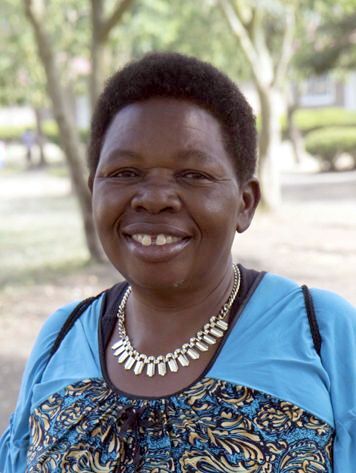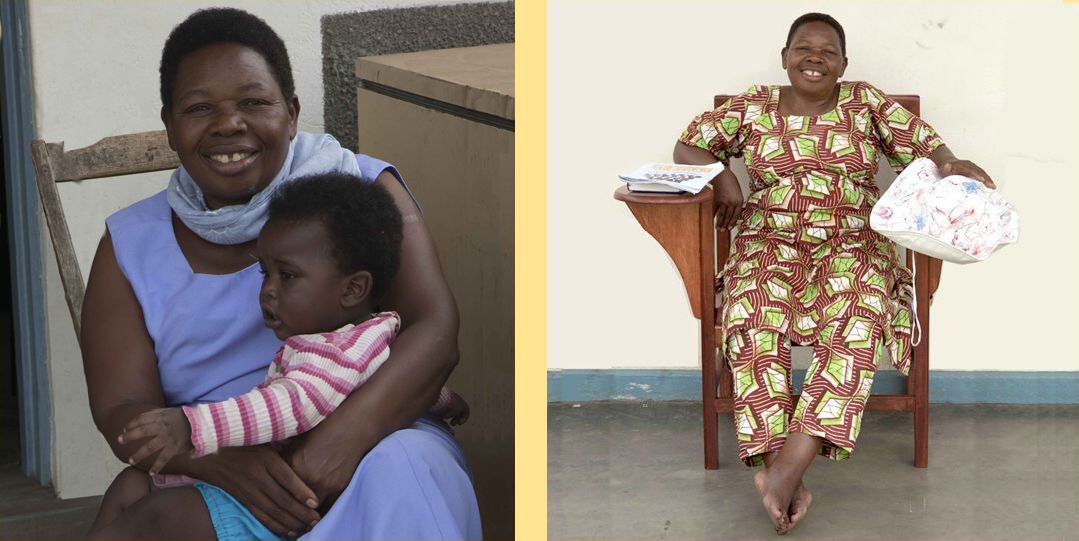Dorothy Nzirambi (2015 Profile)
Dorothy Nzirambi Komusana - Looking Back
 There are several accounts of how Dorothy came to devote her life to feeding newborns and looking after children who have no-one else. Some disagree in important details with Dorothy's own account (written down for her by someone else) — all very worrying.
There are several accounts of how Dorothy came to devote her life to feeding newborns and looking after children who have no-one else. Some disagree in important details with Dorothy's own account (written down for her by someone else) — all very worrying.
Often, such accounts trace Dorothy's vocation back into her early life — suggesting formative experiences that shaped her, without trying to pinpoint a single seminal step that marked the turning point. In all of them, Dorothy is left holding the baby - or babies!
In an account by Milly (her younger sister), Dorothy has to feed their partially paralyzed father "like a baby". Aged 15, she looks after two babies of a cousin who had no wet-nurse and, at 18, after her elder brother's child. During the troubles under Idi Amin Dada, her husband was killed; Dorothy, then 25, was left to look after their 5 children single-handed. Although she didn't know it, Milly says, "... these experiences were preparing Dorothy for a great work in [the] future."
Milly's account then goes on to August 1984 when Dorothy worked in the canteen of Kagando hospital and saved the life of a tiny baby by systematically feeding her. But that account is very different from the authorized version. According to Milly the baby was brought by two men, not just by the father; and Dorothy fed the child with infant formula from the hospital stores, not milk expressed by women in the maternity ward.
What are we to make of this?
Honestly, I don't know — or care. Events may have been embroidered, or different cases confused. But Dorothy saved a baby's life. And she's since saved very many more.
It is in difficult times that her strength of character stands out most. Then it is that no-one can doubt her determination to fight for the children that God has put on her heart. In early 2015, for example, the orphanage was completely full and took the difficult decision to close to new admissions until further notice. Despite this, people continued to arrive with babies they clearly could not feed or care for. Admitting the babies would open the floodgates — and they really couldn't cope with any more. But send them away, and memories of 2012 said that they would almost certainly die. What to do?
Dorothy was decisive. To avoid precedents at Kabirizi, she decamped to premises in Kasese. There she offered short-term help and infant formula while families made their own arrangements, but — as in Ugandan hospitals — only if a family member stayed to look after the baby. Where appropriate, she also gave childcare training. This pragmatic approach has ensured that, so far, no babies have died and all are already being cared for by members of their wider family.
Where there's a will ...
Five years ago, you'd always have found Dorothy with two babies on her laps. Nowadays, she usually has only one. Dorothy doesn't complain, but she has serious back problems — and all the x-rays and tablets that go with it. For some months, she found that she was far more comfortable sitting, not in an easy chair, but on a concrete floor with her back against the wall! So that her back could be supported "bolt upright" without resorting to the floor, a specially designed wooden "throne" was ordered. To judge from her immediate reaction, it was a great success.
How good it is when she's left holding the baby again is a different matter!

